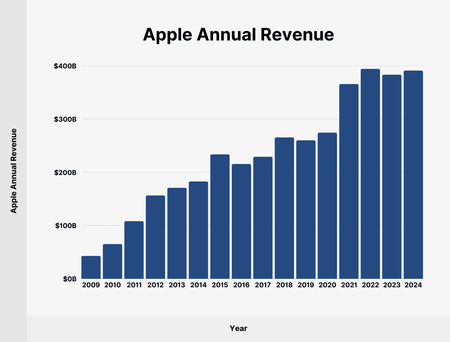Everyone is talking about AI and rushing to get on board. Well, not everyone. Apple doesn’t seem particularly interested in AI development, nor is it hurrying to catch up with its rivals. That could be its ultimate downfall.
WWDC with (almost) no AI. Last week, Microsoft Build and Google I/O took place. At both conferences, the focus centered entirely on AI development. Apple’s WWDC is set for June 9, and rumors suggest there will be little news about its AI strategy. Instead, the company is expected to focus on redesigning its operating systems, a project codenamed “Solarium.”
Apple continues to miss the boat. Apple’s apparent indifference to AI is surprising. As one of the world’s leading tech companies, it continues to ignore expectations—and miss opportunities in the process. While competitors rapidly developed models or partnered with startups such as OpenAI, Apple remained publicly quiet.
That’s not great. The company is already spending billions of dollars to catch up. When it finally introduced its Apple Intelligence platform, the result also disappointed. It’s minimal and painfully slow to roll out. That caution is beginning to take a toll—not financially, but in terms of reputation. The disappointment is sinking in among external analysts and Apple employees, who agree the company is falling behind in AI.
The Siri disaster. Siri, Apple’s voice assistant expected to benefit from AI, is still struggling. Promises from last year remain unfulfilled. Analysts such as John Gruber have described Apple’s concept videos as “crap.” Apple has confirmed delays with Siri, showing just how troubling its position in AI has become.
 Source: Sherwood News
Source: Sherwood News
It’s reminiscent of BlackBerry. Apple’s current image crisis brings to mind the downfall of BlackBerry. That company, along with Nokia, dominated the mobile space in the early 2000s. But when Apple introduced the iPhone, BlackBerry’s response was indifferent. The impact wasn’t immediate—BlackBerry sales actually peaked in 2011. After that, everything collapsed. Today, the brand is a shadow of what it once was.
 Source: Backlinko
Source: Backlinko
Apple is doing very well (for now). On paper, Apple is thriving. ChatGPT’s launch didn’t seem to affect its standing, and global sales continue to rise. But signs of concern are appearing. The iPhone, its flagship product, has peaked. Growth slowed to just 2% in 2024. And behind the scenes, Apple’s quiet and cautious evolution suggests the company can no longer innovate at the pace expected. Executives have already stated they’re no longer chasing the next iPhone. Disruption, it seems, is overrated.
Apple is living in the past. As Bloomberg points out, Apple lives in a “legacy” world. It relies on products and services that continue to work well but don’t seem to anticipate the future. A new collaboration between Jony Ive—Apple’s former lead designer—and OpenAI CEO Sam Altman on AI hardware is another red flag. Apple once excited the world with its disruptive potential. Now, users look to OpenAI or Google instead.
Tim Cook is increasingly criticized. This inability to react quickly has made Apple CEO Tim Cook’s succession a growing topic. The Wall Street Journal summed it up: Problems keep piling up, but Cook’s strategy continues to lean on iPhone momentum.
That momentum won’t last forever. This month, senior Apple executive Eddy Cue testified in a U.S. court case and said something surprising: “You may not need an iPhone 10 years from now, as crazy as it sounds.”
This is an opportunity. Apple has long championed privacy, and that was the core message behind Apple Intelligence. The idea: A private AI that runs partially on-device, without the cloud, and still performs on par with competitors. Right now, its features lag behind. But if Apple can match its rivals’ AI performance while keeping its privacy promise, it may offer something no one else does.
Or maybe two. After all, this is Apple—a company known for arriving late and still winning. It shouldn’t be counted out in the AI race. The company may also have new plays in hardware. Connected glasses could become a valuable accessory for Apple, one that strengthens its iPhone ecosystem. The latest data suggests this is already underway.
Image | Thai Nguyen (Unsplash) | Sherwood News | Backlinko
Related | Apple Finally Launches CarPlay Ultra After It First Announced It in 2022. It Wasn’t Worth the Wait



